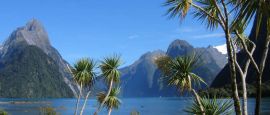New Zealand History, Language and Culture
History of New Zealand
According to legend, New Zealand was created by a mythical demi-god Maui-Tikitiki-a Taranga, from the Polynesian homeland of Hawaiki. Using his magical jawbone as a hook and his blood as bait, Maui caught a great fish, which became the North Island of New Zealand. The South Island is Maui’s canoe and Stewart Island is the anchor.
New Zealand, first settled by Polynesians (the Maori) in the 13th century, has a long history of conflict. The arrival of European explorer Abel Tasman in 1642 confirmed the existence of a southern continent but the first encounter with the Maori was hostile and Abel Tasman never actually set foot on the land.
Captain James Cook charted the country’s coastline more than 100 years later, in 1769. His first encounter with the Maori ended in bloodshed but he persevered and established a friendly relationship. After Cook spread the word, European whalers, sealers and settlers arrived to plunder the rich marine resources and establish a new life.
In 1840, the Treaty of Waitangi – a land ownership agreement between the British and the Maori – was signed, transferring New Zealand to the British crown. The treaty established British law in New Zealand but guaranteed Maori authority over their land. It is held to be New Zealand’s founding document and the original can be viewed in Wellington.
A series of land wars between 1843 and 1872 ended with the defeat of the Maori and vast areas of Maori land were confiscated. In 1975, the Waitangi Tribunal was convened to settle Maori land claims and address this land grab. It has become a permanent commission of enquiry and a means of addressing issues affecting contemporary Maori.
New Zealand became self-governing in 1852 and gained the status as an autonomous dominion of the British Empire in 1907. New Zealand became an independent member of the British Commonwealth in 1947. Queen Elizabeth II remains the head of state, although the monarch has no active role in running the country. As part of the British Commonwealth, New Zealand has tended to follow the United Kingdom and Australia with support in numerous wars over the years.
Helen Clark became New Zealand's first woman prime minister in 1999 and was succeeded by the incumbent John Key in 2008.
Did you know?
• Government incentives and stunning locations have attracted a slew of recent Hollywood films to be shot in New Zealand, including Avatar, The Lord of the Rings, The Hobbit, King Kong and The Last Samurai.
• Rugby union is considered the national sport and the international team, the All Blacks, perform the haka, a traditional Maori challenge before matches.
• Dunedin is a UNESCO City of Literature.




 You know where
You know where